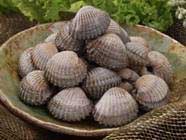
Oysters are pretty much zinc
Mothers should give their children plenty of oysters and oysters to supplement zinc. When zinc is lacking, cells will slowly divide, seriously affecting growth. This condition also leads to delayed growth, bone development disorders and delayed puberty.
Zinc is most present in foods like mussels and oysters; pretty much in red lean meat (pork, beef), coarse grains and legumes (25-50 mg / kg). Prepared cereals, polished rice, fatty meat containing moderate amounts of zinc (10-25 mg / kg). Fish, vegetables, green leafy vegetables and fruits also contain zinc but few.
Zinc helps increase absorption, protein synthesis, cell division, increased appetite, so it is very important for children. Infants, young children, adolescents and pregnant women are prone to zinc deficiency due to high demand. Zinc deficiency in pregnant women reduces infant weight and height. Many studies show that zinc supplementation helps improve height for low-stunted children and rapid weight gain in malnourished children.
Zinc helps the body withstand disease by promoting immune cells to work more effectively, healing wounds. The lack of zinc adversely affects the development and function of most immune cells, making us susceptible to infection, increased risk of acute diarrhea, respiratory infections, malaria .
Zinc will help people eat better. Without it, the metabolism of taste cells is affected, causing anorexia due to taste disorders. Not only have physical effects, zinc deficiency also adversely affects the spirit, it makes you easily angry. The reason is that zinc helps transport calcium into the brain, but calcium is at the top of the list of substances that help stabilize the nerves.
In the first 3 months of life, babies need 120-140 mcg daily for 1 kg of body weight. This demand decreases gradually and by 6-12 months only 1/4 is left. At puberty, due to the rapid growth of the body, the demand for zinc surges, about 0.5 mg a day.
Pregnant women need 100 mg of zinc during pregnancy; demand for the last 3 months is double that of non-pregnant people.
Zinc deficiency is a common problem in the community, especially in poor countries, with the main diet of cereals, less animal food. According to research by Dr. Nguyen Xuan Ninh, National Institute of Nutrition, the rate of zinc deficiency in Vietnamese children is quite high: 25-40%, depending on the locality and age group. This condition is often seen in young children, premature babies, not breastfed, nutrition (especially stunting malnutrition), young or infectious and parasitic diseases. Pregnant women and the elderly also suffer from zinc deficiency.
How to provide enough zinc?
First of all, need to eat a lot of zinc-rich foods, especially seafood. Therefore, preventing zinc deficiency by increasing the intake of zinc-rich foods will have significant benefits for Vietnamese children's health.
For infants, to get enough zinc, try to breastfeed because zinc in breast milk is much more easily absorbed than cow's milk. The amount of zinc in breastmilk in the first month is highest (2-3 mg / liter), after 3 months, it gradually decreases to 0.9mg / l. The amount of zinc that the mother lost through milk in the first 3 months was estimated at 1.4 mg / day. Therefore, mothers need to eat a lot of zinc-rich foods to get enough for both mother and daughter.
If the diet is not guaranteed, zinc can be fortified with zinc supplements, most handy is milk. In Vietnam, high-content fresh milk supplementation was also available (1,500 mcg / 200 ml) like Nutifood's Nuvi, for children - one of the subjects that needs the most zinc. Many other powdered milk also have lower levels of zinc supplementation.
However, if you don't eat 1 mg of zinc, all 1 mg will be absorbed. A decrease in gastric secretion, inorganic iron, phytate may reduce zinc absorption. Phytate is abundant in coarse grains, soybeans and high fiber foods. However, do not rush to limit foods high in phytate because they are essential for health. Eat enough protein from animals because they will limit the disadvantages of phytate-rich foods. In addition, to increase zinc absorption, supplement vitamin C.
Dr. Nguyen Thi Minh Hanh, TT Nutrition City, Ho Chi Minh City

 Green tea cleans teeth better than mouthwash?
Green tea cleans teeth better than mouthwash? Death kiss: This is why you should not let anyone kiss your baby's lips
Death kiss: This is why you should not let anyone kiss your baby's lips What is salmonellosis?
What is salmonellosis? Caution should be exercised when using aloe vera through eating and drinking
Caution should be exercised when using aloe vera through eating and drinking